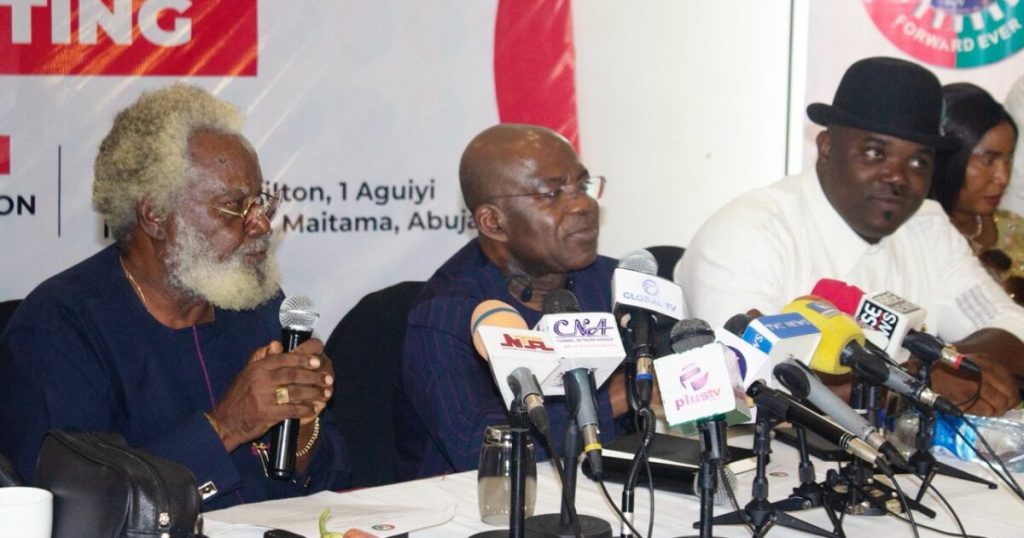The Labour Party (LP) in Nigeria has been embroiled in a power struggle, creating factions and internal discord. At the heart of the conflict are two key figures: Julius Abure, the embattled National Chairman, and Dr. Alex Otti, the Governor of Abia State. Otti, backed by the 2023 presidential candidate, Peter Obi, has spearheaded a move to restructure the party leadership, ostensibly to foster unity and prepare for future elections. This initiative, however, has been met with resistance from Abure and his loyalists, escalating the conflict and threatening the party’s stability. Otti’s call for apologies from Abure and other dissenting members underscores the depth of the divide and the complex challenges facing the LP. This internal power struggle raises questions about the party’s future direction and its ability to present a united front in upcoming elections.
The genesis of the crisis appears to stem from a disagreement over the process of selecting candidates for future elections, particularly the 2027 general elections. Initially, both Otti and Obi were reportedly promised automatic tickets by Abure. However, this promise was later rescinded, purportedly in response to the establishment of a 29-member national caretaker committee by Otti and Obi. This committee, headed by former Minister Nenadi Usman, was tasked with organizing a comprehensive national congress to elect new party executives at all levels. Abure’s faction viewed this move as a direct challenge to their authority, labeling it illegal and an unwarranted interference in party affairs. The withdrawal of the automatic ticket offer for Otti and Obi following the committee’s formation further fueled speculation that it was a retaliatory measure by Abure’s camp. While Abure denied this, claiming the decision was aimed at promoting fair competition, the timing and context of the revocation cast doubt on his explanation.
The escalating tensions culminated in a National Executive Council (NEC) meeting where Otti, flexing his newfound influence within the party, orchestrated the appointment of Senators Nenadi Usman and Darlington Nwokocha as interim National Chairman and National Secretary, respectively. This effectively sidelined Abure and his faction, further exacerbating the existing rift. While presenting this move as a necessary step towards reconciliation and party unity, Otti’s demand for a formal apology from Abure and his allies as a precondition for their reintegration highlights the lingering animosity and mistrust between the opposing factions. The insistence on an apology suggests a power play by Otti’s camp, seeking to assert its dominance and establish a new order within the LP.
The public statements and actions of both sides reveal a complex interplay of power dynamics and strategic maneuvering. Abure’s initial offer of automatic tickets, followed by its retraction, suggests an attempt to appease key figures while maintaining control over the party machinery. Otti’s response, in forming the caretaker committee and subsequently appointing interim leaders, signals a calculated move to challenge Abure’s authority and reshape the party’s leadership structure. The ensuing war of words, with Abure’s faction accusing Otti of meddling in party affairs and Otti’s camp portraying their actions as necessary for party reform, further underscores the deep-seated divisions within the LP.
The demand for an apology from Abure and his supporters serves as a critical bargaining chip in this power struggle. By requiring a public admission of wrongdoing, Otti’s faction aims to not only assert its authority but also potentially discredit and weaken its opponents within the party. This tactic could potentially marginalize Abure and his allies, solidifying Otti’s position and paving the way for a more unified party under his influence, albeit one potentially purged of dissenting voices. The acceptance or rejection of this demand will likely determine the future trajectory of the LP and the balance of power within its ranks.
The unfolding events within the Labour Party underscore the challenges faced by nascent political movements in consolidating power and navigating internal disputes. The conflict between Abure and Otti’s factions highlights the fragility of political alliances and the potential for personal ambitions to undermine party unity. The demand for an apology, while presented as a path towards reconciliation, also reveals the underlying power dynamics and the ongoing struggle for control within the LP. The ultimate resolution of this conflict will have significant implications for the party’s future, its ability to effectively compete in upcoming elections, and its overall credibility as a viable political force in Nigeria. Whether the LP can overcome these internal divisions and emerge stronger remains to be seen.


